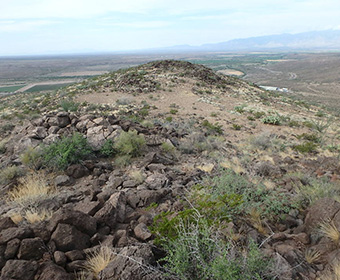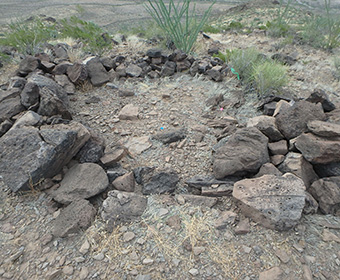UTSA anthropology professor becomes National Geographic Explorer

Archaeologist Robert Hard and his colleagues are trying to determine if this cleared area was once the site of a plaza.

Hard and colleagues discovered this rock ring in southeastern Arizona in 2015.
(May 16, 2017) -- UTSA anthropology professor Robert Hard has been named a National Geographic Explorer and will receive a $20,000 grant from the National Geographic Society to excavate an ancient archaeological site in southeastern Arizona near Safford.
Hard with his colleagues, John Roney and Art MacWilliams, located the archaeological site in 2015. It is located above the desert floor on a hill that includes a large number of ancient structures and rock rings. Based on the ceramics they found, the team believes the site could be about 1,700 years old. Hard hopes the excavation will help him determine whether the location is the site of an early village.
"Usually, most sites of this time period consist of a few houses, however this site appears to once have had about 100 houses with a perimeter wall," said Hard. "The site appears to have a plaza, so we want to verify that is indeed what it is."
Hard and other researchers will travel to Arizona for the excavation in the fall. While there, they will obtain samples to determine the diet of those who once inhabited the land. They will also use a drone to take aerial images of the site, which they hope will allow them to put together a detailed map of the site.
"So much archaeological work has been done in Arizona, and it's amazing that no one has climbed this hill before," said Hard. "The remarkable thing about archaeology is there are still discoveries to be made."
In summer 2018, Hard will take UTSA undergraduate and graduate students to the site to conduct field work.
Hard has been a member of the UTSA faculty for 26 years. He studies ancient societies in Northern Mexico, the American Southwest and Texas that contain diverse archaeological records of past hunter-gatherer and early farming economies. He also supervises undergraduate and graduate students who are studying long-term changes in ancient societies and helps them design and conduct their own research.
For more than 125 years, the National Geographic Society has awarded more than 11,000 grants for research, conservation and exploration.
-------------------------------
Learn more about Robert Hard.
Learn more about the UTSA Department of Anthropology.
Learn more about the UTSA College of Liberal and Fine Arts.
Connect with UTSA online at Facebook, Twitter, YouTube, Instagram and LinkedIn.
Events
Move In To COLFA is strongly recommended for new students in COLFA. It gives you the chance to learn about the Student Success Center, campus resources and meet new friends!
Academic Classroom: Lecture Hall (MH 2.01.10,) McKinney Humanities BldgWe invite you to join us for Birds Up! Downtown, an exciting welcome back event designed to connect students with the different departments at the Downtown Campus. Students will have the opportunity to learn about some of the departments on campus, gain access to different resources, and collect some giveaways!
Bill Miller PlazaCome and celebrate this year's homecoming at the Downtown Campus with food, games, giveaways, music, and more. We look forward to seeing your Roadrunner Spirit!
Bill Miller Plaza

